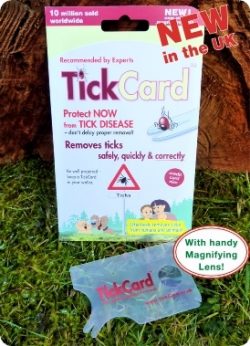By Gill Stewart at
Walking is a safe, enjoyable way to be active outdoors but when an accident, injury or medical incident occurs, it’s best to be prepared. That does not mean you have to carry a massive first aid kit – a few lightweight additions to your backpack and precautions can make all the difference if something occurs when out and about…………………….
BITES & STINGS
 When it comes to ticks, prevention is the best policy. If you know you are walking in tick country ( which is much of the UK as you can see from this website advising pet owners click HERE ), you really do need to use a good deterrent spray such as Botanic Protect or remember to cover up any areas that might brush against long crops, grasses or bracken where the ticks will lurk waiting for you host them! It’s also advisable to carry a tick card so you can remove any that do get through.
When it comes to ticks, prevention is the best policy. If you know you are walking in tick country ( which is much of the UK as you can see from this website advising pet owners click HERE ), you really do need to use a good deterrent spray such as Botanic Protect or remember to cover up any areas that might brush against long crops, grasses or bracken where the ticks will lurk waiting for you host them! It’s also advisable to carry a tick card so you can remove any that do get through.
For nasty mosquito bites, it’s a good idea to carry a sting zapping tool that gives the bite a small piezoelectric zap to relieve the urge to scratch. It’s best used as soon as possible after the bite and a single device can treat multiple stings although use on a single person only is advised for hygiene reasons. You can get them in most chemists and they are a lightweight low cost way to stay comfortable when walking see this one from BOOTS
It’s also a good idea to carry a small tube of sting relief cream which you can also get in all chemists and supermarkets.
The best way to reduce damage and discomfort from twists and knocks is to apply a cold compress – these handy ICE PACK are light to carry and just need to be squeezed in order to turn ice cold. They are also flexible enough to place around ankles and knees etc.
You might also want to consider a small tube of the amazing herbal remedy ARNICA – this one from WELEDA is perfect for an outdoor first aid kit
Minor cuts and grazes may be simply a little sore but don’t just ignore them – its always best to clean them up and cover any open skin. Taking a small first aid kit with wipes, plasters and wound dressings is always advisable. This simple envelope pouch is ideal and there’s enough room to pop in some PELLITEC pads for blister prevention and a FOIL BLANKET which is also something nobody should be without when venturing outdoors into the elements. They are so light you will not know you are carrying them but they can literally save a life if something goes wrong
To be sure you can cope if you, your companions or other walkers you may encounter get the best outcome if something goes wrong – is to be first aid trained and know how to perform CPR ( you can train for free if you visit BRITISH HEART FOUNDATION REVIVR. It’s not a case of having to take responsibility for the person who needs help but knowing how to manage them until the Emergency services arrives can make all the difference. Also knowing what to tell them immediately on the call and when they arrive can be very useful and ensure positive outcomes.
If something does happen, remember to call either 999 or 112 (European Emergency number) and they will put you through to the right agency (fire, ambulance, coastguard etc) If you are going to areas with low signal, it is best to pre- register for the emergency text service so you can send a text to 999 which is more likely to get through – To pre-register, simply text the word ‘register’ to 999.
Make sure you know exactly where you are and can tell them clearly – we advise all WALX leaders to use what3words if they are not confident navigators. This App provides a simple location tag for you to provide them and it’s a great tool for walkers generally so download it before you next set out.
Think also about having one or more ICE (In Case of Emergency) contact numbers on your mobile phone or in your backpack – just create a contact called ICE as that’s what the emergency services will search for first.
DEFIBRILLATORS
Finally, We also think its always a good idea to know the locations of Defibrillators around where you live or walk regularly – you never know when somebody local might need one! If you are walking in an area new to you – it’s also easy to check beforehand just in case somebody in your party or en route feels unwell
It’s really easy to check out where defibrillators are with this handy finder provided by the British Heart Foundation. Remember that if it is an emergency you MUST call 999 before locating or using a defibrillator.
So, our message is simple – enjoy walking but always be prepared by downloading apps, updating your skills/safety contacts plus packing a few lightweight essentials that will make all the difference if something does go wrong! Alternatively book a walk with one of our groups where a qualified leader will have done all of that for you! See our WEBSITE SEARCH or use the WALX APP